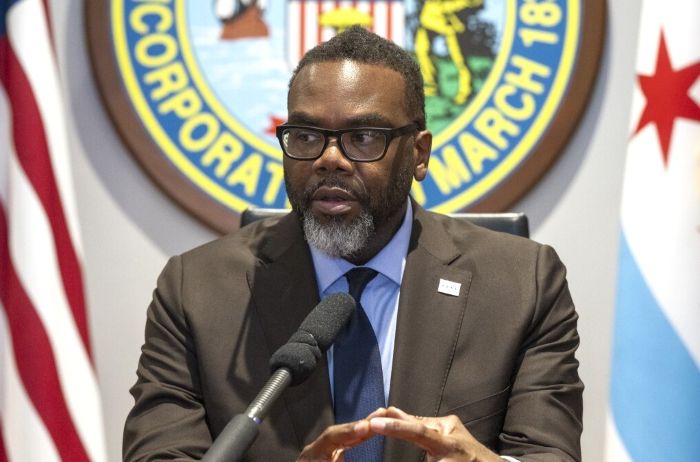Chicago Faces Deepening Budget Challenges as Mayor Johnson Confronts Growing Deficit
As Mayor Brandon Johnson closes the books on Chicago’s 2024 fiscal year, the city finds itself grappling with an even deeper financial shortfall than anticipated. New data reveals a staggering $161 million deficit in the city’s general fund, driven largely by unexpected revenue losses and unresolved financial obligations. The deficit adds pressure as City Hall prepares for a projected $1 billion budget gap heading into 2025.
The shortfall stems from multiple underperforming revenue sources. One of the biggest hits came from a $175 million pension payment that City Hall expected to be reimbursed by Chicago Public Schools (CPS)—a payment that never came through. Adding to the strain was a $165 million drop in personal property replacement taxes from the state. In total, general fund revenues fell $378 million short of expectations in the city’s $16.77 billion budget.
To cushion the blow, the city dipped into its unassigned fund balance, a portion of reserves typically reserved for emergencies. At the end of 2024, Chicago's overall reserve stood at just over $1 billion, down sharply from its $1.94 billion peak in 2022, when federal pandemic relief funds were still flowing. Much of the reserve depletion has gone toward extra pension payments, which are intended to stabilize the city’s four major retirement systems and reduce long-term liabilities.
While some budget officials argued that the current reserve levels remain solid compared to pre-pandemic norms, credit rating agencies like Fitch have warned that Chicago’s fiscal buffer is wearing thin. The city’s reduced reserves come at a time of increasing scrutiny, especially with long-term obligations looming large.
Despite the grim financial landscape, Mayor Johnson remained optimistic, highlighting investments made in housing and economic development, including a $1.25 billion plan aimed at revitalizing underserved communities. In a statement, he emphasized a commitment to “putting people first,” even while acknowledging the tough realities of the city's financial health.
On the spending side, the city did manage to rein in costs, closing 2024 with $217 million less in expenditures than originally projected. General government expenses were particularly low, about $400 million below budget, largely due to reduced debt payments and streamlined operational spending. According to Chief Financial Officer Jill Jaworski, these spending cuts were a “very effective” response to the revenue gap.
However, those savings were largely offset by a $207 million spike in public safety costs, particularly within the Chicago Police Department, where overtime pay and legal settlements continued to strain the budget. These costs have historically been a persistent issue and remain a key challenge moving forward.
The financial report, known as the Annual Comprehensive Financial Report (ACFR), provides a final accounting of the previous year’s budget performance. It was shared with reporters and members of the City Council on Monday, setting the stage for months of deliberation as officials prepare next year’s budget.
There is still hope that CPS will reimburse the city for the pension payment made on behalf of non-teaching staff. While former CPS CEO Pedro Martinez had previously resisted the payment, citing fiscal imprudence, current CPS leadership appears more open to honoring the commitment. Budget Director Annette Guzman noted that the district’s newly reported $730 million deficit includes the pension cost, which could suggest progress toward repayment.
City officials argue that Chicago is unique among Illinois municipalities in footing the pension bill for employees it doesn’t directly manage, adding that this cost burden should eventually shift as CPS moves further from mayoral oversight.
While officials acknowledged the shortfall was anticipated, Ald. Pat Dowell, chair of the Finance Committee, praised the city for proactive cost controls and improvements to pension funding. Efforts are already underway to reduce public safety costs by returning sidelined personnel to duty.
Looking ahead, aldermen are exploring new revenue sources to fill the looming budget gap. Ideas under consideration include advertising on light poles, increasing towing and storage fees, and legalizing video gambling terminals in city bars and restaurants. However, early research suggests that gambling terminals may backfire economically.
A study commissioned by the city projects that video gambling could generate just $200,000 in net revenue in 2026, rising to $12 million in 2027. Worse, it could undercut revenue at Bally’s Casino, the city’s only gaming facility, which contributes a guaranteed $4 million annually to help fund police and fire pensions. The study also warns that hundreds of jobs at Bally’s could be lost if video gambling is expanded citywide.
Still, there were a few positive notes. As of May 2025, city expenditures were $79 million below projections, while revenues exceeded expectations by the same margin. Additionally, the city’s four pension funds saw modest improvement, with the combined funded ratio rising to 26.2%, up from 24.8% the previous year. The total unfunded pension liability also declined slightly to $35.8 billion, down from $37.2 billion.
Even with some signs of progress, Chicago faces a daunting fiscal landscape in the year ahead. As leaders seek creative solutions, the choices they make in the coming months will shape the city’s financial future for years to come.

COMMENTS (0)
Sign in to join the conversation
LOGIN TO COMMENT